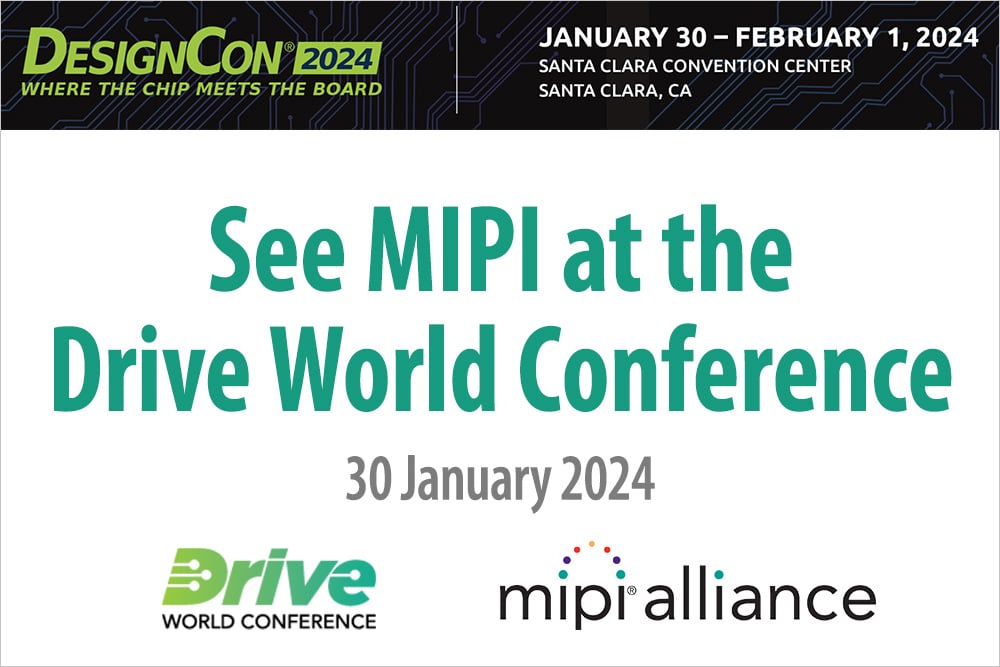3 min read
MIPI Automotive Solutions To Be Highlighted During DesignCon's Drive World Track
![]() Ian Smith, MIPI Alliance Technical Content Consultant
:
17 January 2024
Ian Smith, MIPI Alliance Technical Content Consultant
:
17 January 2024

- News & Events
- News
- Blog
Presentations will focus on the use of MIPI camera, PHY and security specifications for ADAS and ADS applications
Machine-vision-enabling image sensors are essential components within advanced driver-assistance systems (ADAS) and autonomous driving systems (ADS). As the number of image sensors enabling these safety-critical systems increases with each new generation of vehicle, MIPI CSI-2®, a standardized image sensor protocol, has become the de facto imaging protocol used within these systems.
Building upon the adoption of MIPI CSI-2 within automotive vision systems, later this month MIPI technical experts will provide an extended tutorial, “Enabling Trusted Automotive Machine Vision Applications using MIPI Interfaces & Protocols,” at DesignCon 2024 to detail how MIPI’s latest automotive initiatives are supporting and streamlining the use of the MIPI CSI-2 protocol within next-generation safety-critical and trusted automotive vision systems.
The tutorial, which will kick off the event's Drive World conference track, will be relevant to automotive developers, system architects and engineering managers who are focused on the development, integration and test of next-generation automotive vision systems. Attendees will gain a better understanding of how the use of CSI-2, together with MIPI’s framework of approved PHYs and functional safety/security enablers, combine to help developers meet their automotive machine vision goals.
Several MIPI members are also presenting related sessions during the Drive World conference. MIPI Alliance is serving as an official partner of DesignCon 2024, and a 15% discount on registration is offered with the code "MIPI."
Tutorial: Enabling Trusted Automotive Machine Vision Applications using MIPI Interfaces & Protocols
Tuesday, 30 January, 9-11:30 a.m. (PST)
The three-part tutorial will cover three major areas, led by the MIPI experts who are directly involved in the development of these automotive-related specifications. Each portion of the tutorial will also include plenty of time for Q&A, giving attendees the opportunity to gain additional insights from the speakers.
MIPI experts supporting the tutorial are Haran Thanigasalam, MIPI camera and imaging consultant; Edo Cohen, co-chair of the MIPI A-PHY Working Group; and Rick Wietfeldt, co-chair of the MIPI Security Working Group.
Part 1: MIPI CSI-2
The tutorial will first introduce the MIPI CSI-2 imaging protocol, which connects image sensors to their associated ECUs. It will include an overview of the standard features that have been designed into the protocol to benefit automotive imaging systems and enable sensor aggregation optimization, superior objective image quality and energy consumption reduction.
This portion of the tutorial will also explore provisions within CSI-2 to alleviate RF emissions and support “region of interest” extraction, always-on inferencing, wire reduction, longer reach connectivity and reduction of current leakage. The discussion will highlight available physical layer options for CSI-2 implementation, including bridged and natively integrated options.
Part 2: MIPI A-PHY
Next, the tutorial will highlight the latest developments with MIPI A-PHY®, the first industry-standard automotive asymmetric serializer-deserializer (SerDes) physical layer interface offering native coupling to CSI-2 image sensors.
This part will cover the enhancements in the upcoming A-PHY v2.0, which introduces speed gears that double the downlink data rate to 32 Gbps per lane and increase the uplink data rate to over 1 Gbps per lane. It will explore A-PHY’s advanced time synchronization and networking capabilities, its suitability for use in software-defined vehicles, the release of new A-PHY protocol adaptation layers and the introduction of new power-over-A-PHY power classes. In addition, this section will include an overview of the A-PHY reference compliance test suite and the creation of a new MIPI A-PHY Compliance Program.
Part 3: Security
The final part of the tutorial will focus on the essential security requirements for image-sensor-enabled automotive systems to be protected against cybersecurity risks, such as installation of illegitimate sensor components, malicious manipulation of sensor data, and unauthorized access to sensor data.
This section will provide an overview of the MIPI Security Framework, initially comprising four new specifications used to secure connections between CSI-2 image sensors and their related ECUs from the perspectives of authentication, integrity and confidentiality. It will cover how security can be applied to CSI-2 data streams and how MIPI’s application-based security approach is distinct from other methods in its extent and configurability, enabling end-to-end security at the CSI-2 protocol layer.
Related Sessions by MIPI members
DesignCon 2024 will also include related sessions by MIPI members, including several presentations on the value that test and measurement methodologies bring to automotive standards.
These sessions include:
- Approaching Perfect Receiver Tolerance Tests: Using an AWG to De-Embed the Test Fixture While Embedding Channel Response, presented by BitifEye Digital Test Solutions GmBH
31 January, 8-8:45 a.m. (PST) - Automotive High-Speed Serial: How the Harsh Environment Challenges Established Technology & Test Methods, presented by Valens Semiconductor and BitifEye Digital Test Solutions GmBH
31 January, 3-3:45 p.m. (PST) - Panel – Test on Wheels: T&M for Automotive Standards, with participants Valens Semiconductor, BitifEye Digital Test Solutions GmBH, Aviva Links, Keysight Technologies, Robert Bosch GmbH, Resillion and BMW.
30 January, 4:45-6 p.m. (PST)
For a complete description of the sessions to be presented, see the Drive World at DesignCon agenda.

